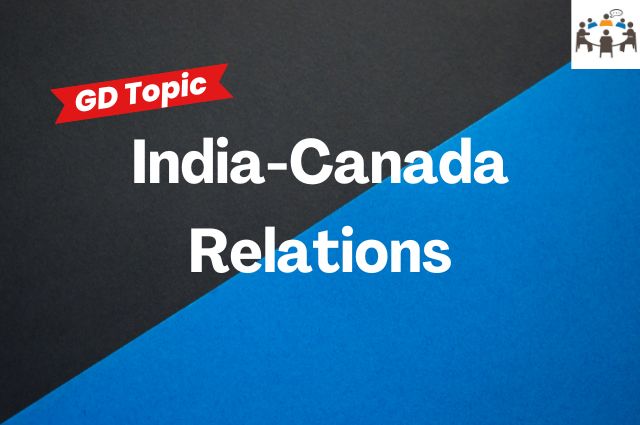Theme:
- On September 19, 2023, Canadian Prime Minister Justin Trudeau accused the Indian government of involvement in the assassination of Hardeep Singh Nijjar, a Canadian Khalistan extremist. The allegations have not been proven true. Canada has not released any evidence to support its claims. The accusations have caused a significant strain in relations between Canada and India. Let’s explore the evolution of the India-Canada relationship and why it is deteriorating in recent years.
History:
- India and Canada have a long history of relations. In 1947, both countries officially established diplomatic relations with each other. Canada was one of the first countries to recognize India’s independence.
- The two countries have maintained close relations since then. In 1948, Canada opened a high commission in New Delhi, and India opened a high commission in Ottawa in 1949.
- Bilateral relations flourished during the 1970s and 1980s. Canada became an important partner for India, especially in trade, education, and technology.
- India’s nuclear tests in 1998 strained relations with Canada due to differences in nuclear proliferation policies. Canada imposed sanctions, but over time, relations improved.
- The two countries share a number of common values, including democracy and diversity.
Importance of India and Canada for each other:
- Canada hosts the seventh-largest Indian diaspora in the world.
- India has been the largest source for international students in Canada, since 2018.
- In terms of trade, in 2022, India was Canada’s 10th largest trading partner. The trade between both countries was quite balanced, totalling around $8 billion, with India enjoying a small trade surplus of approximately $58 million in 2022–23.
- India is the world’s fastest-growing major economy, and its growing market is increasingly important for Canada’s growth.
- India and Canada are both members of a number of international organizations together, including the United Nations, the Commonwealth of Nations, and the G20, now known as G21. The two countries work together on a number of global issues, such as climate change, development, and security.
- India and Canada are also important players in the Indo-Pacific region, helping to curtail China’s growing presence.
Challenges:
- Canada is home to supporters of the Khalistan ideology. The Indian government has accused Canada of being too sympathetic to the Khalistan movement and of not doing enough to crack down on Khalistani extremists in Canada.
- Meanwhile, the current government in Canada is willing to damage its relationship with India to win the support of these Khalistani extremists in order to win their votes and stay in power.
- For vote bank politics, current Canada’s government has repeatedly interfered in India’s internal affairs, such as accusing India of human rights violations in the context of the Kashmir conflict, the Citizenship Amendment Act, and the Farm laws.
- As of now, relations between Canada and India have worsened due to baseless accusations made by Canadian Prime Minister Justin Trudeau against the Indian government, accusing them of involvement in the assassination of a Canadian citizen who was a Khalistani extremist. Both countries have suspended visas for each other’s citizens and issued travel advisories regarding visiting the respective countries.
Result of the Conflict:
- The conflict has already damaged the relationship between India and Canada to the point that it may take years to improve it again. This would make it more difficult for the two countries to cooperate on important global issues.
- The conflict could lead to economic losses for both countries. The trade potential and benefits between India and Canada are significant; however, it will now take even more time to realize their full potential.
- It will also make it difficult to cooperate in maintaining peace and stability in the Indo-Pacific region.
Conclusion:
India and Canada are important partners, but they also have a number of disagreements. The relationship could improve or deteriorate in the coming years, depending on how the two countries manage their differences.
Canada must prioritize long-term diplomatic relations with India over short-sighted vote bank politics. By disavowing extremist ideologies, addressing India’s concerns, and engaging in constructive dialogue, Canada can foster a mutually beneficial relationship that transcends electoral considerations and promotes peace and stability in the region. This is not only beneficial for the trade and growth of each other but also for internal peace and stability in Canada. Providing a haven to extremists is always a bad idea and can cause significant harm to Canada in the future.
Both countries have a number of shared interests, and they have a long history of cooperation. If the two countries are able to manage their differences in a constructive way, they can avoid the negative consequences of the conflict. It is in the best interests of India, Canada, and the world for major economies like India and Canada to resolve the conflict and strengthen their relationship.
Your Turn…
What’s your take on this topic? Express your point of view in the comment section below. Subscribe to our blog to read answers to the trending GD topics.
References:
- The India-Canada standoff: What led to it, the problems it raises
- Canada-India relations
- India-Canada Relations
Copyright @ Group Discussion Ideas.

